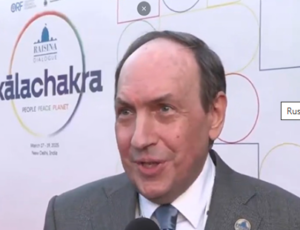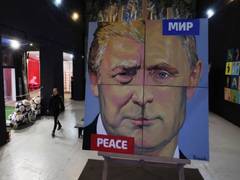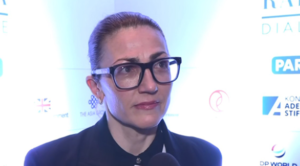Xi Jinping in Moscow for talks with Putin; Says his peace plan to end Ukraine war addresses concerns of all
Beijing/Moscow, Mar 20 (PTI) Ahead of his crucial talks with Russian President Vladimir Putin in Moscow, Chinese President Xi Jinping said on Monday that his peace plan to end the raging Ukraine war takes into account the “legitimate” concerns of all parties and reflects the broadest common understanding of the international community.
Xi arrived in Moscow on a three-day official visit, official media in China reported on Monday.
Making his first visit abroad after his endorsement as President and head of the military for an unprecedented third five-year term by China’s Parliament earlier this month, Xi is due to hold talks with Putin during which he is expected to pitch for peace talks to end the Ukraine conflict.
“Russia was the first country I visited after I was elected President 10 years ago,” Xi said in an article titled “Forging Ahead to Open a New Chapter of China-Russia Friendship, Cooperation and Common Development” published in Russia’s newspaper Russian Gazette on Monday.
Xi, 69, who maintained close ties with Putin during his 10-year tenure stitching together with him an anti-US alliance, said he visited Moscow eight times in the last 10 years and met the Russian leader over 40 times during bilateral and multilateral occasions.
While the thrust of his article was on further developing the strategic ties against the damaging acts of hegemony, domination and bullying , an apparent dig at the US, it also highlighted Xi’s peace plan to end the Ukraine war.
Buoyed by China’s successful mediatory role in bringing a peace deal between arch-rivals Iran and Saudi Arabia recently following which the two warring Arab countries agreed to resume diplomatic ties, Xi now focuses on brokering a deal to end the Russia-Ukraine war in a bid to enhance Beijing’s role in global diplomacy.
Since last year, there has been an all-round escalation of the Ukraine crisis, Xi said in his article.
Significantly, Xi is the first world leader to meet Putin after the International Criminal Court (ICC) issued an arrest warrant against the Russian leader accusing him of committing war crimes in Ukraine.
While there is no imminent danger of Putin being arrested by the ICC, its warrant was seen as a serious image crisis for him as 123 countries are members of the Court.
“China has all along upheld an objective and impartial position based on the merits of the issue, and actively promoted peace talks,” he said.
“I have put forth several proposals, i.e., observing the purposes and principles of the UN Charter, respect of the legitimate security concerns of all countries, supporting all efforts conducive to the peaceful settlement of the crisis, and ensuring the stability of global industrial and supply chains,” Xi said in his article.
They have become China’s fundamental principles for addressing the Ukraine crisis, he said.
Xi said his peace plan takes into account the legitimate concerns of all parties and reflects the broadest common understanding of the international community on the crisis.
It has been constructive in mitigating the spillovers of the crisis and facilitating its political settlement. There is no simple solution to a complex issue, he said.
“We believe that as long as all parties embrace the vision of common, comprehensive, cooperative and sustainable security, and pursue equal-footed, rational and results-oriented dialogue and consultation, they will find a reasonable way to resolve the crisis as well as a broad path toward a world of lasting peace and common security,” he said.
About Russia-China ties, Xi said: “together we have drawn the blueprint for the bilateral relations and cooperation in various fields, and have had timely communication on major international and regional issues of mutual interest, providing firm stewardship for the sustained, sound and stable growth of China-Russia relations.”
“My upcoming visit to Russia will be a journey of friendship, cooperation and peace. I look forward to working with President Putin to jointly adopt a new vision, a new blueprint and new measures for the growth of China-Russia comprehensive strategic partnership of coordination in the years to come,” Xi said.
Ahead of Xi’s visit, Chinese Foreign Minister Qing Gang spoke over the phone with his Ukrainian counterpart Dmytro Kuleba during which he called for peace talks between Moscow and Kyiv.
According to the Chinese Foreign Ministry, Qin expressed hope that Ukraine and Russia would keep the door open for dialogue and negotiation, and not close the door to a political settlement.
Xi is also expected to speak to Ukraine President Volodymyr Zelenskyy to push for his peace plan though there is a great deal of scepticism in Beijing about the chances of success for China’s plan considering Ukraine is closely aligned with the US and EU without whose consent it cannot reach a peace deal with Russia, especially after enormous damage it suffered due to the Russian offensive.
In the 12-point paper highlighting its stand on the Ukraine conflict issued last month, China has called for a ceasefire followed by peace talks to end the Ukraine war. It however struck a nuanced stand of respecting Ukraine’s sovereignty and legitimate security concerns of Moscow and expressed its firm opposition to the use of nuclear weapons.
Beijing so far has not condemned the Russian invasion of Ukraine and continues to maintain close political, trade, and military ties with Moscow.
Significant points of China’s stand in its position paper were a call for ceasing hostilities and global support for the resumption of direct peace talks between Russia and Ukraine to end the war, respect for Ukraine’s sovereignty and Moscow’s legitimate security concerns and Beijing’s opposition to threat or use of nuclear and biological weapons.
XI in the article also said the two countries stayed in close communication and coordination in the UN, the Shanghai Cooperation Organisation (SCO), BRICS, the G20 and other multilateral mechanisms, and worked together for a multi-polar world and greater democracy in international relations.
“We have been active in practicing true multilateralism, promoting the common values of humanity, and championing the building of a new type of international relations,” he said.






